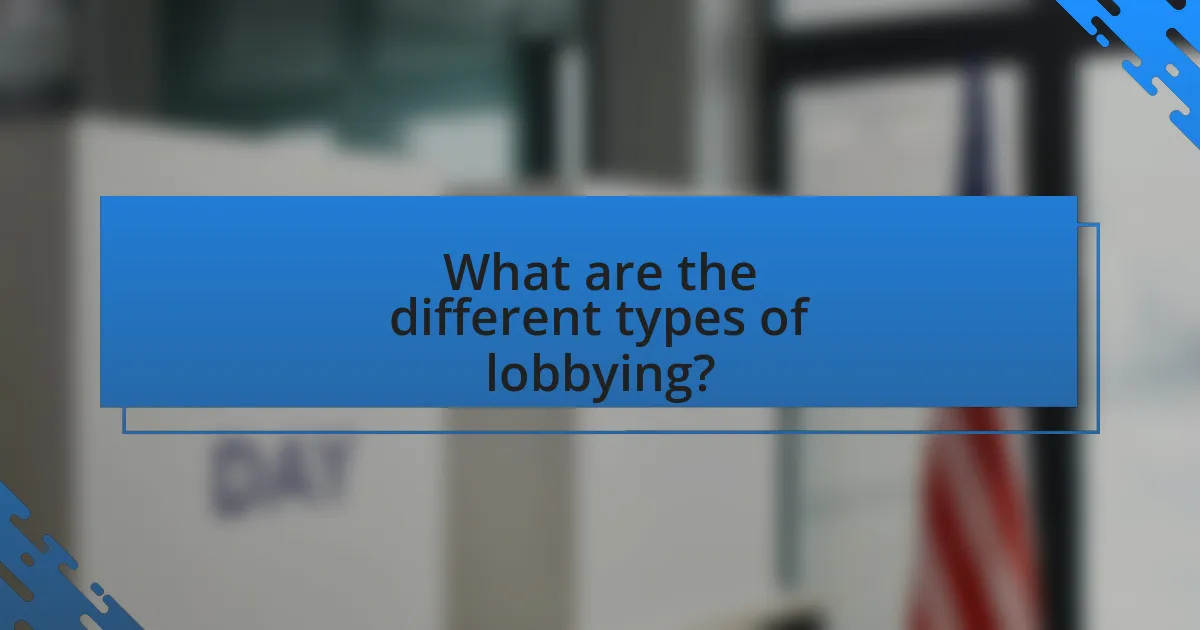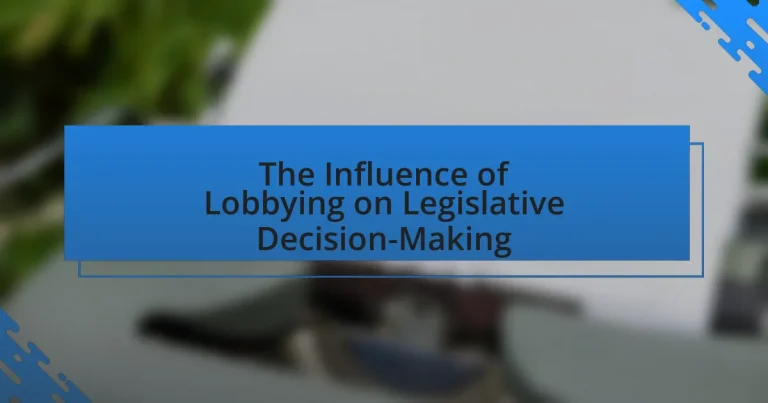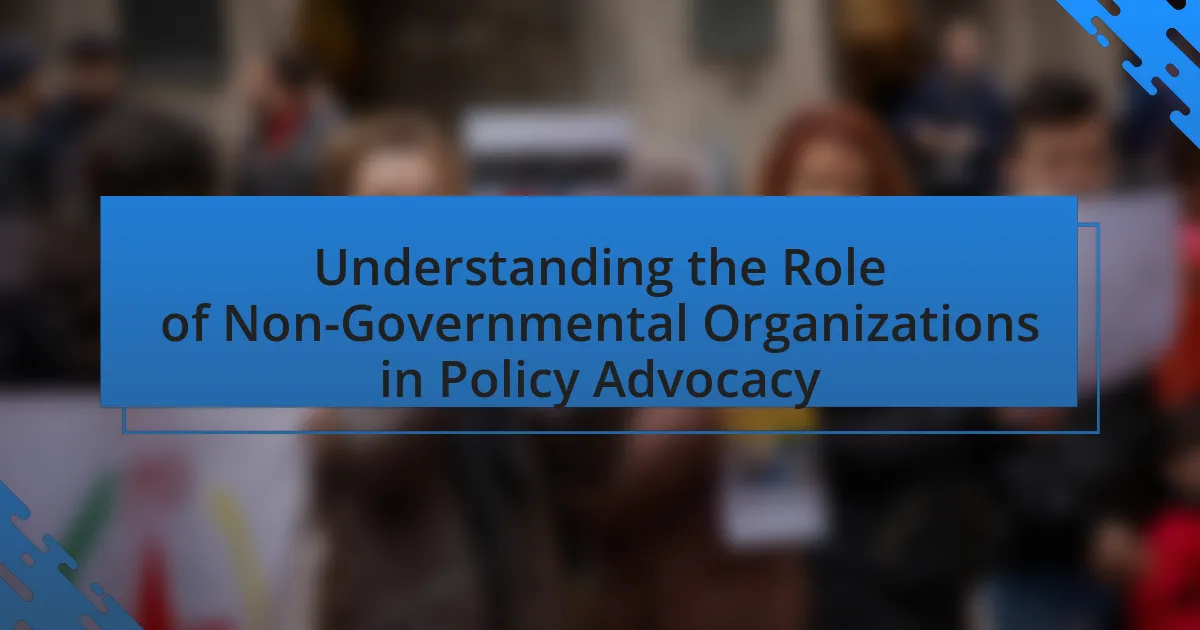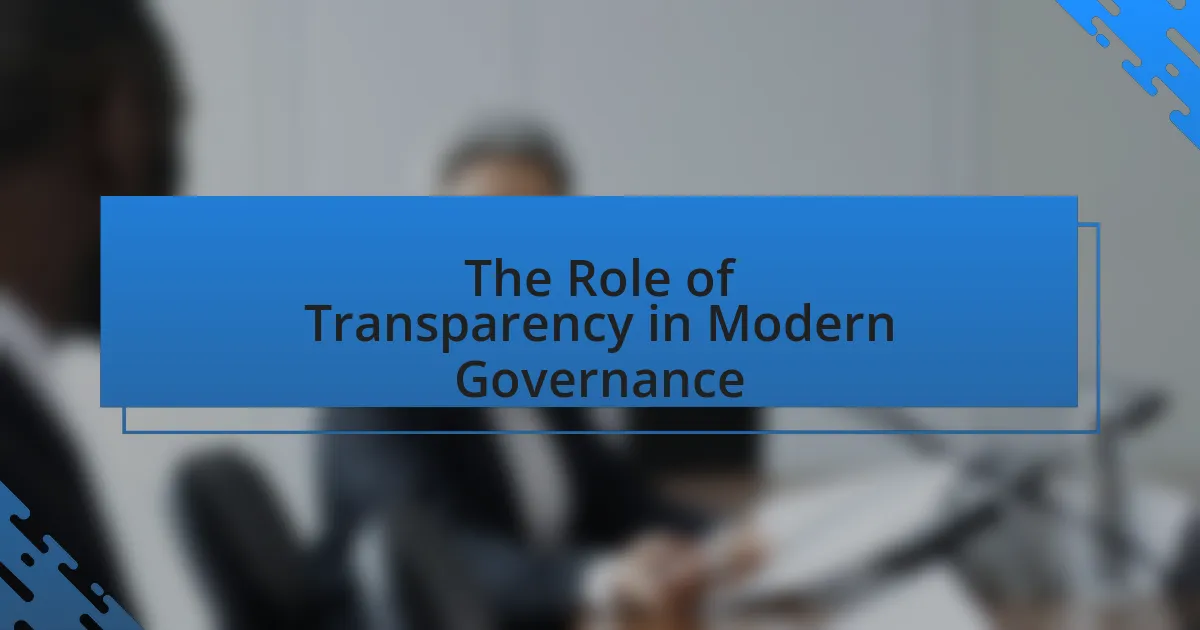The article examines the influence of lobbying on legislative decision-making, highlighting how lobbyists shape lawmakers’ priorities and actions through financial contributions, information dissemination, and direct communication. It discusses the substantial financial resources allocated to lobbying, with over $3.5 billion spent in the United States in 2020, and the mechanisms through which lobbying impacts policy outcomes. The article also explores the ethical considerations surrounding lobbying, the historical context of its development, and the various types of lobbying, including direct and grassroots efforts. Additionally, it addresses the role of public perception in shaping lobbying’s effectiveness and the importance of transparency and accountability in the legislative process.

What is the Influence of Lobbying on Legislative Decision-Making?
Lobbying significantly influences legislative decision-making by shaping the priorities and actions of lawmakers. Lobbyists provide information, resources, and financial support to legislators, which can lead to favorable outcomes for specific interests. For instance, a study by the Center for Responsive Politics found that in 2020, over $3.5 billion was spent on lobbying in the United States, highlighting the extensive financial resources directed towards influencing policy. This financial leverage often translates into access to lawmakers, allowing lobbyists to advocate for particular legislation or amendments that align with their clients’ interests. Additionally, research published in the American Economic Journal indicates that lobbying can lead to legislative outcomes that reflect the preferences of well-funded interest groups rather than the general public, demonstrating a tangible impact on policy direction.
How does lobbying impact the legislative process?
Lobbying significantly impacts the legislative process by influencing lawmakers’ decisions and shaping policy outcomes. Lobbyists, representing various interest groups, provide information, resources, and advocacy to legislators, which can lead to the prioritization of specific issues or legislation. For instance, a study by the Center for Responsive Politics found that in 2020, over $3.5 billion was spent on lobbying in the United States, highlighting the substantial financial resources dedicated to influencing legislative agendas. This financial influence often translates into access to lawmakers, allowing lobbyists to present their perspectives and sway legislative priorities, ultimately affecting the laws and regulations that govern society.
What are the key mechanisms through which lobbying influences decision-making?
Lobbying influences decision-making primarily through direct communication, financial contributions, and the mobilization of public opinion. Direct communication occurs when lobbyists engage with lawmakers to present information, arguments, and data that support specific policies or legislation. Financial contributions, such as campaign donations, can create a favorable environment for lobbyists by increasing their access to decision-makers and enhancing their influence over legislative outcomes. Additionally, lobbyists often mobilize public opinion by organizing grassroots campaigns, which can pressure legislators to align with the interests they represent. These mechanisms are supported by research indicating that lobbying efforts can significantly sway legislative priorities and outcomes, as evidenced by studies showing correlations between lobbying expenditures and favorable legislative actions.
How do lobbyists interact with legislators and their staff?
Lobbyists interact with legislators and their staff primarily through direct communication, meetings, and the provision of information. They often schedule meetings to discuss specific legislation, share research, and advocate for particular policy outcomes. This interaction is facilitated by the lobbyists’ expertise and knowledge of the legislative process, which allows them to present their case effectively. According to the Center for Responsive Politics, in 2020, over $3.5 billion was spent on lobbying efforts in the United States, highlighting the significant role lobbyists play in shaping legislative agendas.
Why is lobbying considered a significant factor in legislation?
Lobbying is considered a significant factor in legislation because it directly influences lawmakers’ decisions and priorities. Lobbyists provide critical information, expertise, and resources that can shape policy outcomes, often representing specific interests or industries. For instance, the Center for Responsive Politics reported that in 2020, over $3.5 billion was spent on lobbying in the United States, highlighting the substantial financial resources dedicated to influencing legislative processes. This financial investment underscores the power of lobbying in shaping laws and regulations that align with the interests of those who fund lobbying efforts.
What historical context has shaped the role of lobbying in politics?
The historical context that has shaped the role of lobbying in politics includes the evolution of democratic governance and the increasing complexity of societal issues. Lobbying emerged in the United States in the early 19th century as a response to the growing need for various interest groups to influence legislative decisions. The establishment of formal lobbying practices can be traced back to the 1946 Federal Regulation of Lobbying Act, which aimed to bring transparency to lobbying activities. This act required lobbyists to register and disclose their activities, reflecting a recognition of the significant impact that organized interests have on policy-making. Additionally, landmark events such as the Civil Rights Movement and the rise of environmental advocacy in the 1960s further solidified lobbying as a crucial mechanism for various groups to advocate for their interests, demonstrating its integral role in shaping legislative outcomes.
How do public perceptions of lobbying affect its influence?
Public perceptions of lobbying significantly affect its influence by shaping the legitimacy and acceptance of lobbying activities among lawmakers and the general public. When the public views lobbying as a necessary part of democracy, it can enhance the effectiveness of lobbyists in advocating for specific interests. Conversely, negative perceptions, often fueled by scandals or perceived corruption, can lead to increased scrutiny and regulation of lobbying practices, thereby diminishing their impact. For instance, a 2019 Pew Research Center survey indicated that 75% of Americans believe that lobbying has a negative effect on the political system, which can result in lawmakers being more cautious in their interactions with lobbyists. This dynamic illustrates how public sentiment directly influences the operational landscape of lobbying and its ability to sway legislative outcomes.

What are the different types of lobbying?
There are several types of lobbying, including direct lobbying, grassroots lobbying, and astroturf lobbying. Direct lobbying involves direct interaction with lawmakers or government officials to influence legislation, often through meetings or formal communications. Grassroots lobbying mobilizes the general public to contact legislators and express their views, aiming to demonstrate widespread support or opposition to specific issues. Astroturf lobbying creates a façade of grassroots support, often funded by organizations to simulate public backing for a cause. Each type plays a distinct role in shaping legislative outcomes and reflects different strategies employed by interest groups to influence decision-making processes.
What are the main categories of lobbying activities?
The main categories of lobbying activities are direct lobbying, grassroots lobbying, and coalition lobbying. Direct lobbying involves direct interaction with lawmakers or government officials to influence legislation or policy decisions. Grassroots lobbying focuses on mobilizing the public to contact legislators and express their views on specific issues, thereby creating pressure from constituents. Coalition lobbying involves multiple organizations or interest groups coming together to advocate for a common cause, amplifying their influence through collective action. These categories are essential for understanding how different strategies are employed to shape legislative outcomes.
How do direct and indirect lobbying differ in their approaches?
Direct lobbying involves direct interaction between lobbyists and lawmakers to influence legislation, while indirect lobbying seeks to influence public opinion or mobilize constituents to pressure lawmakers indirectly. Direct lobbying typically includes meetings, phone calls, and written communications with legislators, whereas indirect lobbying often utilizes media campaigns, grassroots mobilization, and public advocacy to shape perceptions and encourage legislative action. For example, the American League of Lobbyists reported that direct lobbying accounted for over 50% of lobbying expenditures in 2020, highlighting its prevalence and direct approach in influencing legislative outcomes.
What role do grassroots lobbying efforts play in influencing legislation?
Grassroots lobbying efforts play a significant role in influencing legislation by mobilizing public support to pressure lawmakers. These efforts often involve community organizing, petitions, and social media campaigns that raise awareness about specific issues, thereby creating a sense of urgency among legislators to respond to constituents’ concerns. For example, studies have shown that grassroots movements can lead to increased voter engagement and can sway legislative outcomes, as seen in the successful campaigns for environmental regulations and healthcare reforms in the United States. This demonstrates that when constituents actively participate in the political process, their collective voice can effectively shape policy decisions.
What are the ethical considerations surrounding lobbying?
The ethical considerations surrounding lobbying include transparency, accountability, and the potential for undue influence on policymakers. Transparency is crucial as it ensures that lobbying activities are disclosed, allowing the public to understand who is attempting to influence legislation. Accountability involves holding lobbyists and legislators responsible for their actions, ensuring that decisions are made in the public interest rather than for personal or corporate gain. The potential for undue influence arises when lobbyists, often representing powerful interests, can sway legislative outcomes disproportionately, leading to policies that may not reflect the broader public’s needs. For instance, research by the Center for Responsive Politics indicates that in 2020, over $3.5 billion was spent on lobbying in the United States, highlighting the significant financial resources that can be directed toward influencing legislative processes.
How do regulations govern lobbying practices?
Regulations govern lobbying practices by establishing legal frameworks that dictate how lobbyists can interact with government officials and influence policy. These regulations often require lobbyists to register with government authorities, disclose their activities, and report expenditures related to lobbying efforts. For example, the Lobbying Disclosure Act of 1995 in the United States mandates that lobbyists file detailed reports on their lobbying activities, including the issues they are advocating for and the amounts spent, thereby promoting transparency and accountability in the lobbying process. Such regulations aim to mitigate corruption and ensure that the influence of lobbying is conducted within ethical boundaries, thereby shaping the legislative decision-making process.
What are the potential consequences of unethical lobbying?
Unethical lobbying can lead to significant consequences, including the erosion of public trust in government institutions. When lobbyists engage in deceptive practices or exert undue influence, it undermines the integrity of the legislative process, resulting in policies that may favor special interests over the public good. This can manifest in legislation that prioritizes corporate profits at the expense of environmental protections or public health, as seen in cases like the tobacco industry’s lobbying efforts that delayed regulations for decades. Furthermore, unethical lobbying can contribute to increased political polarization, as citizens perceive their representatives as being more responsive to lobbyists than to their constituents, ultimately diminishing civic engagement and participation in the democratic process.

How does lobbying affect specific legislative outcomes?
Lobbying significantly influences specific legislative outcomes by shaping policymakers’ decisions through information dissemination, financial contributions, and strategic advocacy. For instance, research indicates that industries with substantial lobbying expenditures, such as pharmaceuticals, often achieve favorable legislation, evidenced by the passage of the Medicare Prescription Drug, Improvement, and Modernization Act of 2003, which was heavily supported by pharmaceutical lobbyists. This act resulted in a substantial increase in government spending on prescription drugs, demonstrating how lobbying can directly alter legislative priorities and outcomes.
What are the most common issues influenced by lobbying?
The most common issues influenced by lobbying include healthcare, environmental regulations, taxation, and corporate governance. Healthcare lobbying often focuses on drug pricing and access to services, with significant spending from pharmaceutical companies, which totaled $306 million in 2020. Environmental regulations are heavily influenced by industries such as oil and gas, which spent over $100 million in 2021 to shape policies on climate change and emissions. Taxation issues are frequently lobbied by corporations seeking favorable tax treatments, with the business sector investing around $1.5 billion in lobbying efforts in 2020. Corporate governance is also a key area, where lobbying efforts aim to influence regulations on shareholder rights and executive compensation, reflecting the interests of major corporations and their stakeholders.
How do lobbyists prioritize their efforts on specific legislation?
Lobbyists prioritize their efforts on specific legislation by assessing the potential impact of the legislation on their interests and the likelihood of its passage. They analyze factors such as the political climate, key decision-makers, and the interests of constituents to determine which issues are most critical to their goals. For instance, a study by the Center for Responsive Politics found that lobbyists often focus on legislation that aligns with their clients’ financial interests, as seen in the healthcare and energy sectors, where significant resources are allocated to influence policy outcomes. This strategic approach enables lobbyists to effectively allocate their time and resources to maximize their influence on legislative processes.
What case studies illustrate successful lobbying efforts?
Successful lobbying efforts are illustrated by the case studies of the American Medical Association (AMA) and the National Rifle Association (NRA). The AMA effectively lobbied for the Affordable Care Act in 2010, influencing key provisions that expanded healthcare access, demonstrating the power of organized medical professionals in shaping health policy. Similarly, the NRA has successfully lobbied against gun control legislation, notably influencing the outcome of the 1994 Assault Weapons Ban, which expired in 2004, showcasing the effectiveness of grassroots mobilization and political contributions in legislative processes. These examples highlight how targeted lobbying can significantly impact legislative outcomes.
How does lobbying shape public policy beyond legislation?
Lobbying shapes public policy beyond legislation by influencing the regulatory environment, public opinion, and the agenda-setting process. Through direct engagement with policymakers, lobbyists can affect the implementation and interpretation of existing laws, ensuring that regulations align with the interests of specific groups. For instance, the American Petroleum Institute has successfully lobbied for favorable regulations in the energy sector, demonstrating how lobbying can lead to significant shifts in regulatory frameworks. Additionally, lobbying efforts often include public relations campaigns that shape public perception and mobilize grassroots support, further impacting policy discussions and priorities. Research indicates that organizations that invest in lobbying can significantly sway public discourse, as seen in the healthcare sector where pharmaceutical companies have influenced both public opinion and policy outcomes through targeted lobbying strategies.
What influence does lobbying have on regulatory agencies?
Lobbying significantly influences regulatory agencies by shaping policy decisions and regulatory outcomes. Through direct communication, financial contributions, and strategic advocacy, lobbyists can sway the priorities and actions of these agencies. For instance, a study by the Center for Responsive Politics found that industries such as pharmaceuticals and energy spend billions annually on lobbying efforts, which can lead to favorable regulations or the delay of stricter rules. This financial leverage allows lobbyists to gain access to decision-makers, thereby impacting the regulatory landscape in ways that align with their interests.
How do lobbyists contribute to the development of policy agendas?
Lobbyists contribute to the development of policy agendas by providing specialized information, advocating for specific interests, and influencing lawmakers’ priorities. They engage with legislators to present data, research, and case studies that support their positions, thereby shaping the understanding of issues. For instance, a study by the Center for Responsive Politics found that in 2020, over $3.5 billion was spent on lobbying in the United States, demonstrating the significant financial resources dedicated to influencing policy. This investment allows lobbyists to establish relationships with policymakers, ensuring that their perspectives are considered in the legislative process.
What strategies can be employed to navigate lobbying effectively?
To navigate lobbying effectively, individuals and organizations should employ strategies such as building strong relationships with policymakers, understanding the legislative process, and utilizing data-driven advocacy. Building relationships with policymakers fosters trust and opens communication channels, which can lead to more favorable outcomes. Understanding the legislative process allows lobbyists to identify key decision-makers and critical moments for influence. Utilizing data-driven advocacy, supported by research and statistics, strengthens arguments and demonstrates the impact of proposed policies, making them more persuasive. For instance, a study by the Center for Responsive Politics found that organizations that effectively leverage data in their lobbying efforts tend to achieve higher success rates in influencing legislation.
How can legislators balance lobbying interests with public good?
Legislators can balance lobbying interests with public good by implementing strict transparency and accountability measures. These measures include requiring lobbyists to disclose their funding sources and lobbying activities, which allows legislators to assess the potential influence of special interests on their decision-making. For instance, the Lobbying Disclosure Act in the United States mandates that lobbyists register and report their activities, providing a framework for transparency. Additionally, legislators can prioritize public engagement through town hall meetings and public consultations, ensuring that constituents’ voices are heard alongside lobbying efforts. Research shows that when legislators actively seek public input, they are more likely to make decisions that reflect the broader interests of their constituents rather than those of specific lobbying groups.
What best practices should be followed to ensure transparency in lobbying?
To ensure transparency in lobbying, organizations should adopt practices such as mandatory registration of lobbyists, detailed reporting of lobbying activities, and public disclosure of funding sources. Mandatory registration requires lobbyists to register with government authorities, providing a clear record of who is lobbying and on behalf of which interests. Detailed reporting mandates that lobbyists disclose the specific issues they are advocating for, the government officials they meet, and the amounts spent on lobbying efforts. Public disclosure of funding sources allows citizens to understand who is financially supporting lobbying activities, thereby enhancing accountability. These practices are supported by various regulations, such as the Lobbying Disclosure Act in the United States, which aims to promote transparency and reduce the potential for corruption in the legislative process.





